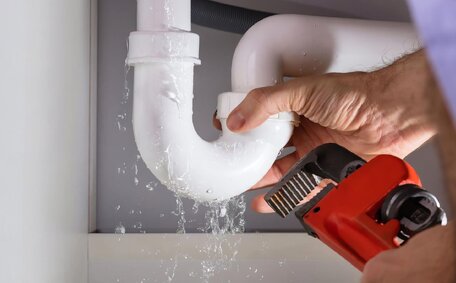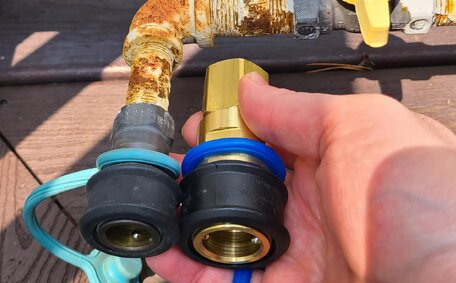Introduction to Septic Systems
A septic tank system can serve as a private underground sewerage system commonly used in rural areas lacking public sewer access. It holds the liquid waste long enough to allow solids to settle out forming sludge and oil to float to the surface as scum.
A typical system comprises both a septic tank and a drain field. The septic tank, as part of effective tank systems, is a buried, water-tight container usually made of concrete, fibreglass, or polyethylene. The clarified liquid then exits the septic tank to enter the septic tank leach field.
The drain field, featuring perforated pipes laid in gravel-filled trenches, facilitates the removal of contaminants through percolation.
Grasping the functionality of your septic system and its maintenance is essential for homeowners. Blockages and malfunctions can cause wastewater to back up into your home’s surface or seep into groundwater. Routine pumping of the tank, limiting what goes down drains, and not overloading the system with excess water/waste helps to keep your septic system running smoothly.
How Blocked Drains Can Overload and Damage Septic Tanks
A clogged septic system can lead to significant problems by overloading with more wastewater than it’s designed to manage. When clogged drains occur due to various items, blockages can occur and wastewater may back up through your pipes into the septic tank.
Excess wastewater can make its way into a septic tank, reducing the amount of time solids have to separate before the clarified liquid moves to the drain field. This can overwhelm your septic tank’s ability to adequately treat contaminants. Partially treated effluent can pond on the surface, journey into septic tank territory improperly, or clog the drain field - rendering the system useless.
Overloading can trigger severe scenarios, such as rapidly ejecting wastewater from the tank, which disrupts the settled sludge. This higher flow stirs up sludge in your tank, sending excess solids to the drain field and clogging perforated pipes. Tree roots search for nutrients and moisture, invading and breaking pipes, and could also cause severe damage once they detect an overload.
To protect your sewer line, manage water use wisely during storms or high rainfall, reducing strain on your drains.
Avoid harsh drain cleaners and excessive antibacterial products that destroy beneficial bacteria, and have the septic system routinely pumped to prevent sludge buildup.
Signs Your Septic System Is Failing Due to a Blockage
For informational purposes only, here are several indicators of common septic tank issues, suggesting your system is failing due to a blockage:
- Sewage backup in household drains upon flushing toilets
- Gurgling sounds from plumbing fixtures
- Your toilet draining slower than usual
- Your sink and tubs draining slowly
- Pools of water or muddy soil around the septic tank or when you drain septic contents into the drain field
- Lush green grass over the drain field while nearby grass appears normal
- Strong sewage odours around drains or the septic tank and drain field
These are the most common indicators of problems septic tanks face, suggesting wastewater is not flowing out properly. Solids can accumulate and block the outlet baffle or sludge may be forced into the drain lines at septic tank where pressure due to excess water entering the tank. Tree roots, soil intrusion, or collapsed piping in the collection system can also cause backups.
If these warning signs appear, it’s advisable to promptly contact a professional plumber to remediate the blocked septic system. Your blocked system will no longer function correctly and only get worse over time if not properly cleared, pumped, or repaired. Swift action can help prevent a sewage backup into your home, protecting your family, the drain field integrity, and reducing groundwater contamination on your property.
Preventing Blockages to Maintain Septic Health
There are several key steps homeowners can take to prevent blockages and maintain a healthy septic system:
- Avoid flushing anything except human waste toilet essentials down toilets. Items like wet wipes, paper towels, tissues, cigarette butts, grease, feminine hygiene products, condoms, dental floss, cat litter, and other foreign objects can clog pipes and damage septic tank function.
- Avoid pouring paint, pesticides, automotive fluids, pharmaceuticals, or other hazardous chemicals into your drains.
- Fit lint filters to washing machines and sinks to trap debris and maintain clearer water pipes. Lint and hair can accumulate and potentially damage your larger pipeline obstructions.
- Avoid using chemical drain openers, which can kill beneficial bacteria and disrupt the digestion process in the septic system.
- Conserve your water supply, fix leaks promptly, and space out laundry loads to avoid sending excess water down drain lines and overloading the system. Be especially mindful during flooded or soggy ground conditions.
- Annual professional assessment of the septic tank to measure sludge and scum buildup, determining the appropriate pumping schedule, is recommended.
Proactively addressing tank issues can help homeowners avoid frequent pump-outs and costly repairs.
Effects of Weather on Septic Tanks
Meteorological conditions can have a substantial effect on septic system functionality. Heavy or sustained rainfall, especially after flood conditions, is particularly problematic as it can overload the septic tank drain with excess water, stir up sludge, and saturate drain fields.
In heavy rainfall, reduce the use of water-intensive appliances and shorten showers to limit wastewater entry into the tank while ensuring stormwater is diverted from the septic drain field.
Excessive rainfall can overwhelm septic systems, leading to flooded drain fields and displaced effluent that may surface. Professionally pump the tank after prolonged wet conditions to remove surplus sludge. Inspect electrical floats, pumps, alarms to ensure they are correctly operating, channeling water away from where it shouldn’t be.
Freezing temperatures can cause sewage to freeze inside pipes and prevent wastewater from draining away from the house. Insulate access ports and manholes or consider an effluent filter to prevent solids escaping the tank.
High temperatures and drought conditions cause soil moisture levels to drop, reducing the drain field’s ability to effectively filter waste. Make sure to conserve household water usage during these periods.
Routinely maintaining the main sewer line along with septic tanks is important year-round, preventing malfunctions from trickling down your system during weather extremes. Consider professional repairs if you continually notice sewage odours, slow drains, or excess moisture around your septic system despite your best efforts.
Troubleshooting Common Septic Issues Related to Blockages
When faced with septic system issues related to blockages, there are several troubleshooting steps homeowners can try before calling a professional:
Inspect the Tank
Carefully remove the manhole cover while wearing protective clothing, like rubber gloves, to keep your hands safe and avoid direct contact with sewage. If either is blocking the baffles or over 12 inches thick, arrange to have the tank pumped out soon possible.
Check the inlet and outlet baffles for blockages and try to clear any obstructions.
Clear Clogs Around the House
Try to clear sinks, tubs, and drains where gurgling is heard. If multiple drains are slow, indicating a blockage in the main drain line, contact a professional promptly.
Utilise a drain snake for hair and grease removal and opt for a mix of baking soda and vinegar over chemical cleaners.
Inspect Drain Field Distribution Box
Employ an effluent filter to avert solids from exiting the tank and obstructing pipes.
Check for signs of standing water or sewage. Clear any visible obstructions from piping without damaging infrastructure.
While minor issues can be self-corrected with vigilance, extensive damage or raw sewage backups require expertise. If any septic problems persist despite preventive maintenance, immediately call a professional plumber to properly diagnose and service your sewer system before contamination worsens.
When to Call a Professional Plumber
It’s crucial to call a professional plumber right away if you experience a blocked sewer or any of the following with your septic system:
- Raw sewage coming drain and backing up into household drains
- Strong sewage odours around the house or outdoor system components
- Sewage leaks detected near the septic tank, pipes or soakaways
- Toilet and sink backups that persist despite attempts to plunge or snake drains
- Standing water or muddy soil around the tank and drain field area
- Lush spotty grass growth over the drain field
- Slow draining toilets or gurgling sounds despite conservative water use
Septic systems contain biological hazards and require expertise to locate and repair leaks or blockages. Attempting to fix issues yourself can further spread sewage contamination across your property and add costs if you inadvertently damage components.
Gladesville Plumbing’s licenced technicians have decades of experience maintaining and repairing sewer main infrastructure across Sydney’s urban and rural communities. If you suspect your septic system is compromised, call our emergency line immediately on 1300 349 338 so we can contain the failure and get your plumbing restored safely.
Routine Septic Maintenance
Routine maintenance is crucial for keeping a septic system functioning properly and extending its lifespan. There are several key maintenance tasks homeowners should perform:
Inspect Annually
Have a professional inspector examine all physical components of the septic system, including the water level, once a year. Measure sludge and scum, check water levels, pump frequency and distribution, inspect piping, outlets, vents, alarms, pumps, and valves. This enables preventive repairs before small issues become catastrophic failures.
Pump Septic Tank
Experts suggest pumping septic tanks every 3-5 years to clear solids, preventing clogs and overflows, depending on household size and a typical 1,000-gallon tank capacity.
Solids also reduce the tank’s overall wastewater storage capacity. Local environmental factors also impact pumping frequency.
Protect Drain Field
Avoid driving over septic system areas and divert roof drainage from the site, planting grass only to prevent root damage.
Having your household conserve water will keep soil saturation reduced and minimize runoff. Avoid construction activity or soil compaction over the field. Ensure only water, decomposable solid waste, and wastewater enter the drain field.
Exercise Caution With Additives
Avoid flushing additives like biofilms and enzymes into the septic system as they may impede sludge digestion. Also, limit harsh chemicals that destroy the tank’s beneficial bacteria.
Regular septic system upkeep enhances performance and minimises blockages or failures. Consult Gladesville Plumbing for tailored advice on system maintenance.






